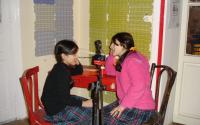Rajiv Chandrasesekaran
Even before the war began, the Bush administration swore to protect Iraq's "patrimony" for the Iraqi people. It turns out that the administration's definition of "patrimony" was exceedingly narrow, however. Hence, the military quickly put guards around the Oil Ministry and the intelligence offices in Baghdad, while much of official (and unofficial) Baghdad was looted. As much as anything, a country's patrimony is its past. Imagine, in the wake of a war, looters breaking into the Smithsonian and making off with everything from the documents of the Founding Fathers and the earliest flags to Judy Garland's magic slippers (from the Wizard of Oz), or breaking into the Metropolitan in New York and stripping it bare of a significant part of the human artistic patrimony. Actually, it's unimaginable - and yet that just happened in Baghdad with some of the most precious objects of our most ancient history, objects that stand in for life lived over 5,000 years ago, for where civilization and the city itself began. It's staggering to imagine.
John Burns of the New York Times quotes an Iraqi archaeologist, Raid Abdul Ridhar Muhammad, who couldn't get the Marines to post troops at the National Museum of Antiquities as it was being looted this way:
"[He] directed much of his anger at President Bush. 'A country's identity, its value and civilization resides in its history,' he said. 'If a country's civilization is looted, as ours has been here, its history ends. Please tell this to President Bush. Please remind him that he promised to liberate the Iraqi people, but that this is not a liberation, this is a humiliation.'" (Pillagers Strip Iraqi Museum of Its Treasure)
A piece by Rajiv Chandrasekaran in the Washington Post, 'Our Heritage Is Finished', catches an edge of the sadness of this moment in the words of Nabhal Amin, the museum's deputy director,
"'This was priceless,' she sobbed as she pointed to two seated marble deities from the temple at Harta that had been defaced with a hammer. Later, after observing more damage, she broke down again. 'It feels like all my family has died,' she wept.
"Even storage rooms and workshops were trashed. An old Babylonian wooden harp was broken in two and its gold inlay scraped off. But most inexplicable to her was the destruction of rooms that contained no artifacts, just archaeological records and photographs. 'I cannot understand this,' she said. 'This was crazy. This was our history. Our glorious history. Why should we destroy it?'"
The most unfortunate thing, it turns out, is that all this was imaginable. As John Noble Wilford has written in today's Times (Art Experts Fear Worst In the Plunder of a Museum),
"For weeks before the war, archaeologists and other scholars had alerted military planners to the risks of combat, particularly postwar pillage of the country's antiquities…. Experts reminded the Defense Department that after the Persian Gulf war of 1991, 9 of Iraq's 13 regional museums were plundered. The Baghdad museum was spared then because the end of war had left the government still power and policing the city."
http://www.nationinstitute.org/tomdispatch/index.mhtml?pid=573






